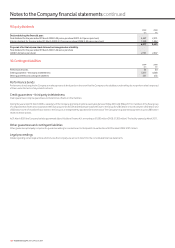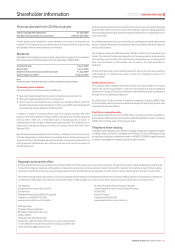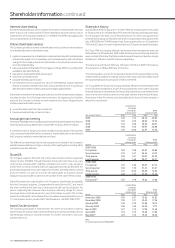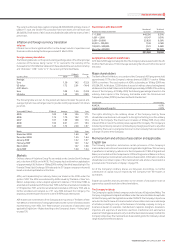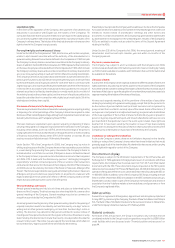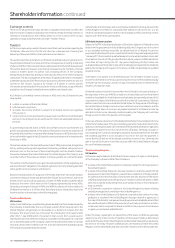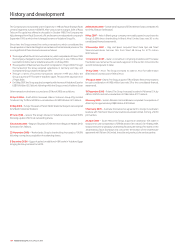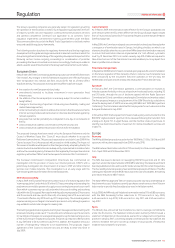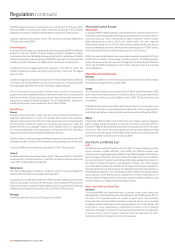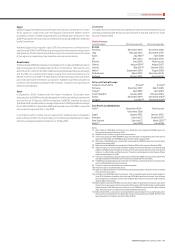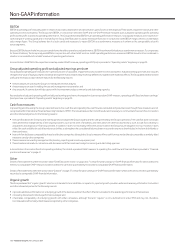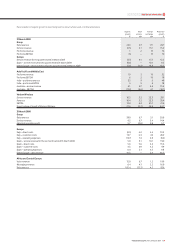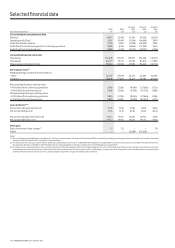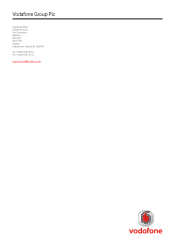Vodafone 2009 Annual Report Download - page 138
Download and view the complete annual report
Please find page 138 of the 2009 Vodafone annual report below. You can navigate through the pages in the report by either clicking on the pages listed below, or by using the keyword search tool below to find specific information within the annual report.
136 Vodafone Group Plc Annual Report 2009
The NRA adopted a decision on universal service contributions for the years 2003,
2004 and 2005. In its decision for 2006, it declared an amount of €75.3 million
payable by the industry. Vodafone will be liable for a proportion of this amount.
Vodafone reduced its termination rate to 7.87 eurocents in October 2008 and to
7.00 eurocents in April 2009.
United Kingdom
An auction of 2.6 GHz spectrum is expected to commence during 2009. The NR A also
proposes to auction 72 MHz of digital dividend spectrum suitable for mobile
communications in the 790-862 MHz range during the 2010 calendar year. The NRA
published proposals to allow refarming of 900 MHz spectrum, but proposed that
Vodafone and O2 first release 2 x 2.5 MHz each for reallocation to other parties.
Vodafone UK filed an appeal against the proposals of the NRA to reform the
number portability processes and reduce porting times to two hours. The appeal
was successful.
Vodafone’s regulated average termination rate from April 2008 to March 2009 was
5.75 pence. The rate will decline to 4.72 pence for the year commencing April 2009
following appeals by BT and H3G to the competition appeals tribunal.
The UK Government has specified a wireless radio spectrum modernisation
programme under its digital Britain project. Elements of the project include resolving
the future of existing 2G radio spectrum and commitments by mobile operators to
extend the coverage of mobile broadband. The UK Government is expected to
publish further details of its proposals over the summer of 2009.
Other Europe
Greece
Vodafone Greece and other mobile operators have encountered difficulties in
obtaining authorisations to install and maintain base stations and antennae.
Operators have proposed amendments to the relevant law and have requested that
the Government extend the deadline for obtaining such approvals. In May, the
Government set a new deadline of March 2010. Vodafone Greece is negotiating
a co-location agreement to site base stations on the premises of OTE, following a
regulatory decision in February 2009 mandating co-location.
Vodafone Greece continues to appeal findings and sanctions arising from the 2007
interception incident. A number of civil lawsuits are also pending in the Greek courts.
In January 2009, the termination rate reduced by 20.7% to 7.86 eurocents.
Ireland
Vodafone Ireland will reduce its termination rates to 7.80 eurocents from 1 April 2010
and reductions to 7.00 eurocents from 1 April 2011, and then to 5.00 eurocents from
1 April 2012 until April 2013 are expected.
Netherlands
The NRA acknowledged Vodafone’s compliance with 3G coverage obligations.
Auctions of 2.6 GHz spectrum are expected in early 2010.
An appeal by one stakeholder against the NRA’s decision setting call termination
rates was successful. As a result, the termination rate remained at 9.90 eurocents.
A final court decision is expected in May 2009. Unless the court decides otherwise,
Vodafone’s rate is expected to be reduced in July 2009 to 7.00 eurocents.
Portugal
The NRA is expected to auction 2.6 GHz spectrum in 2009.
Africa and Central Europe
South Africa
In January 2009, the NRA published, under the Electronic Communication Act, Act
36 of 2005, a notice indicating that it is issuing converted licences to close the licence
conversion process, which commenced in 2006. Vodacom’s mobile cellular
telecommunications licence, which was issued under the now repealed
Telecommunications Act, Act 103 of 1996, has been transformed into two distinct
licences: an individual electronic communications network service (‘I-ECNS’) licence
and an individual electronic communications service (‘I-ECS’) licence.
All formerly value added network services providers have been issued with I-ECS and
I-ECNS licences similar to those issued to existing operators. The NRA gazetted a
further document setting out a process through which it will determine Standard
Terms and Conditions Regulations, licence fees, spectrum fees and universal
service obligations.
Other Africa and Central Europe
Romania
In September 2008, the Government issued a sixth mobile licence. Mobile number
portability was implemented in October 2008.
Turkey
The Government undertook an auction of four 2.1 GHz licences in November 2008.
Each of the three existing operators obtained licences. Concession agreements
were awarded to the successful bidders in April 2009. The fourth licence was
not awarded.
The NRA adopted rules in April 2009, which require Turkcell to ensure that on-net
tariffs do not fall below a level determined by reference to the prevailing mobile
termination rate. Mobile number portability was implemented in November 2008.
Ghana
In November 2008, the NRA ruled on interconnection charges, setting a migration
path to a single rate for termination on all fixed and mobile networks by 2010. In
December 2008, the NRA awarded Ghana Telecommunications one of five national
3G licences. The licences have been issued as provisional authorisations, pending
conversion to formal licences once the NRA board has been reconvened by the new
Government, which came into power in January 2009.
Asia Pacic and Middle East
India
The NRA announced the elimination of access deficit charges payable by private
service providers to BSNL, effective 1 April 2008. The TRAI announced a new
interconnection usage charge regime effective 1 April 2009 whereby, the termination
rate for all types of domestic calls were reduced to 20 paise per minute. Vodafone
Essar and a number of operators and industry bodies have appealed this decision to
the Telecom Dispute Settlement and Appellate Tribunal. The TRAI released
recommendations enabling the introduction of mobile virtual network operators in
the Indian telecommunications network. The Department of Telecommunications is
reviewing these regulations. The anticipated auctions of 3G and broadband wireless
access spectrum were deferred by the Department of Telecommunications. In
February 2009, the Department of Telecommunications initiated a tender process
for the introduction of mobile number portability services.
Other Asia Pacific and Middle East
Australia
The Australian NRA has determined that it considers a rate of nine cents to be
appropriate for mobile call termination during the period until 30 December 2011, in
the event that individual parties are unable to agree terms. The Australian
Government has announced that it intends to underwrite the roll out of a national
broadband network, which will provide wholesale fibre access to third parties. The
Government is also undertaking a comprehensive review of the regulatory
framework, including consideration of the existing arrangements for the regulation
of services such as call termination, universal service arrangements (to which
Vodafone currently contributes) and consumer measures.
Regulation continued


